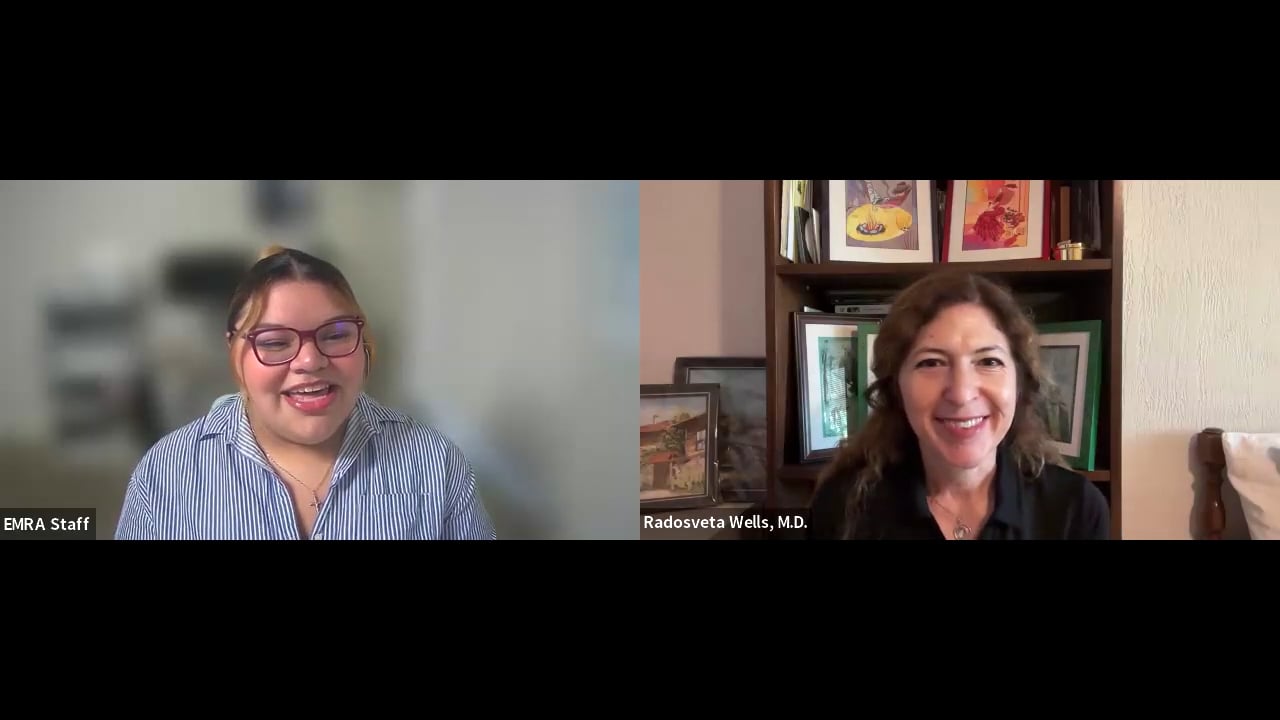2022 Match Day and Beyond
Sahar Rammaha, OMS-III, Michigan State University College of Osteopathic Medicine
EMRA MSC Midwest Coordinator, 2022-23
Revelle Gappy, MS-II, Oakland University William Beaumont School of Medicine
EMRA MSC Great Lakes Regional Representative, 2022-23
Jacques Lowe, MS-III, Carle Illinois College of Medicine
EMRA MSC Great Plains Regional Representative, 2022-23
Congratulations to all who matched!
As the chaos and celebration of Match Day 2022 winds down, it is time to recap this past year’s cycle and evaluate what it means for the future of emergency medicine and for upcoming applicants. The impact of COVID-19 is still felt as virtual interviewing continues on for nearly all specialties. It is also the first application cycle since the 2021 ACEP Jobs Report, released shortly after Match Day 2021, which predicted an excess supply of emergency physicians. As the field of emergency medicine continues to expand and the COVID-19 pandemic continues, applicants entered into the match season with continued uncertainty and unknowns.
The numbers
According to the National Residents Match Program (NRMP), 81 new PGY-1 emergency medicine positions were added for this cycle, 219 spots went unfilled, and there was a 7.0% decrease in positions filled compared to last year. The NRMP estimates that this is due to fewer ranks submitted by U.S MD and DO Seniors that may reflect interests in the workforce prospects after residency. In total, 642 new positions have been added since 2018, an increase of 28.2% (1).
EMRA will continue to advocate for our field and find innovative solutions that will positively influence the future of the EM workforce. On January 31, 2022, EMRA President Dr. Angela Cai released a statement addressing the continued efforts in understanding the supply and demand of EM physicians.
What now?
If you’re a newly-matched M4, check out the following:
- EMRA Student-Resident Mentorship Program
- Mentor medical students entering our field and pay the advice forward!
- EMRA Committees
- Join a committee that reflects your interests within the field, attend events, and collaborate on committee work.
- EMRA Financial Planning
- As you transition from student to resident, EMRA provides several resources to guide financial planning, loan navigation, and preparation for life after residency.
- And most importantly, enjoy your time before residency!
Once again, congratulations to the newly-matched M4s! Below is a brief interview from Dave Wilson, outgoing MSC Vice-Chair, Tyler Ridgon, outgoing MSC West Coordinator, and Luke Wolhford, outgoing MSC Editor, where they will recap their experiences of this past cycle:
David Wilson, MS4
- Past Vice Chair
1) What advice would you give to yourself at this time last year?
At this time last year, I think the best thing I did was write the first draft of my personal statement. Having a draft done so that it wasn't hanging over my head during audition rotations freed up some bandwidth to focus more on the rotation.
2) Did you rank programs differently based on the virtual interview experience? If so, what factors made you do so?
I'm not sure if I ranked programs differently, but I was definitely more focused on the program and the people during my interviews-- perhaps if interviews were in person I would have been just as focused on the location.
3) Where did you match? What are you looking forward to the most? How will you celebrate?
I matched at the University of Cincinnati, and I couldn't be happier! There are so many things I'm excited about, but I can't wait to meet all of my co-interns in person. This last month has felt like an endless celebration, but I'm starting to move on to figuring out where I am going to live.
Tyler Ridgon, MS4
- Past West Coordinator
1) Why did you rank where you matched and how do you feel about it?
I am incredibly grateful and excited — there are too many reasons to fully express here. I was originally exposed to UC Irvine residents as a scribe prior to medical school, some of whom inspired me to enter Emergency Medicine. I then did my away rotation here, which solidified my interest in UC Irvine as they had the kindest faculty and residents. Ultimately, the most important factors for me were long-term career goals (I wanted an academic residency with great training), location (residency where I wanted to practice), and of course culture.
2) How was the overall camaraderie of the other applicants this past year based on interactions from discord/spreadsheet/aways?
Excellent! Whether virtually or in person, everyone genuinely seemed to encourage others. It is incredibly important to have camaraderie, as Emergency Medicine is a team-based career.
Luke Wohlford, MS4
- Past Editor
1) What advice would you give to yourself at this time last year?
I would tell myself to relax and trust the process last year, but I know I wouldn't have listened! My preconceptions about many programs I applied to were drastically different after interviews, and going into interviews with an open mind helped me make better decisions come time for making a rank list.
2) Did you rank programs differently based on the virtual interview experience? If so, what factors made you do so?
It's hard to know if it would be different if interviews were in person, but I definitely felt the personality of a program come through during the interview. Who chose to give up part of their day to interview us was very telling about the priorities and culture of the program.
3) Where did you match? What are you looking forward to the most? How will you celebrate?
I matched at the University of Vermont! I'm most excited to work with a team of people similarly interested in revolutionizing the field of EM, while exploring all my sub-specialty interests in a variety of hospitals in the region.
Moving forward
As the Match 2023 cycle is only in its beginning stages, M3 students nationwide are preparing to enter their final year of medical school. At this stage, they have decided that emergency medicine is the specialty of their choice. EMRA has your back — to help prepare you for your away rotations and obtain a fantastic SLOE, sign up for the April EMRA Hangout Session “How to Ace Your Away Rotation and Get a Glowing SLOE” on April 28th. While the results of Match 2022 are still in the process of being understood, students shouldn’t lose sight of what’s important. Making sure that you’re prepared for your auditions in order to finish off your final year of medical school should top your list. If you haven’t yet, find your mentors and ask upperclassmen how to navigate this process if you find yourself confused.
In recent news, COPA has also relaxed its limitations on away rotations this year, and applicants may be wondering about their next steps to obtain the appropriate amount of SLOEs. For our M3s, the Council of Residency Directors in Emergency Medicine (CORD EM) has released an official statement to help guide students seeking the appropriate amount of SLOEs during their away rotations. More information can be found here with CORD EM’s official consensus statement.
What next?
There has not yet been a declaration of virtual interviews continuing into the 2022-2023 cycle, however, this may still be the case. Officially starting this next cycle, EM applicants will be able to assign 5 signals to their most desired program at the initial time of submission to indicate interest. These signals should not include home programs or away rotations as they are likely to receive an interview offer. The purpose of preference signaling will increase transparency in the application process to better align interview yield for applicants. Past experiences and geographic preferences will not be included. Additionally, the preference signaling implemented this year will be optional for emergency medicine applicants. Students are given a choice to participate in preference signaling, leaving a statement on ERAS notifying programs that a student has dedicated not to participate. What does this mean for the applicant? Many will question whether or not they should participate. To help you decide if preference signaling is safe, research has been funneled by other specialties that have previously participated in these processes highlighting the support for its use and its benefits to students (2). We understand many questions will still arise, so stay tuned for an EMRA Hangout Session that will go over all of the details and implications of signal preferences!
________________________________________
Related Content


Feb 10, 2025
Interview with Mark Reiter, MD, MBA, MAAEM, UTHS-Murfreesboro/Nashville Emergency Medicine
In the latest installment of our PD Q&A series, we are highlighting the Emergency Medicine Residency Program at University of Tennessee Health Science-Murfreesboro/Nashville. We spoke with the current PD Dr. Mark Reiter about what makes their program unique and what they look for in potential residents.

May 26, 2023
PD Interview Saks at Crozer Chester
In the latest installment of our PD Q&A series, we are highlighting the Crozer Chester Medical Center Emergency Medicine Residency program. We spoke with the current PD Dr. Mark Saks, MD, about what makes his program unique and what he looks for in potential residents.




